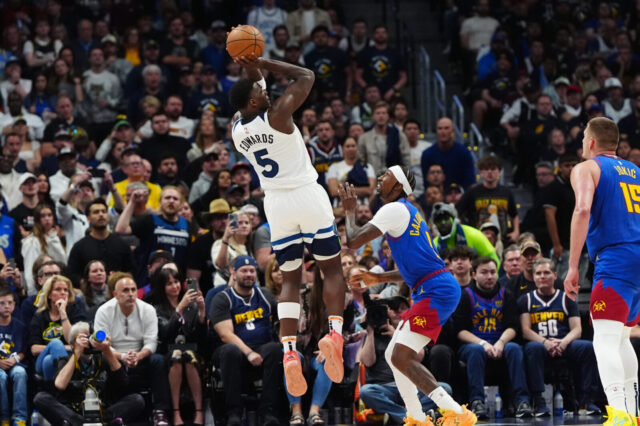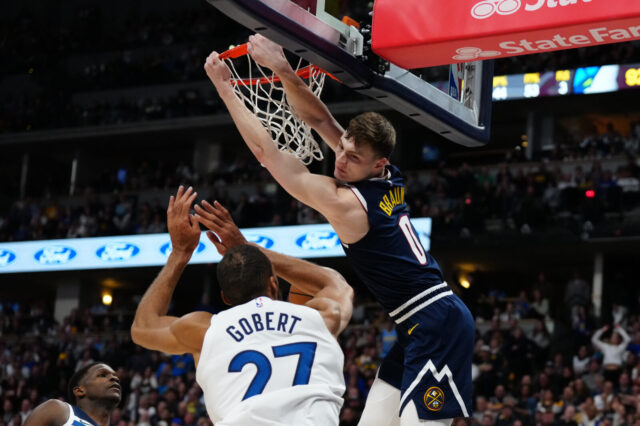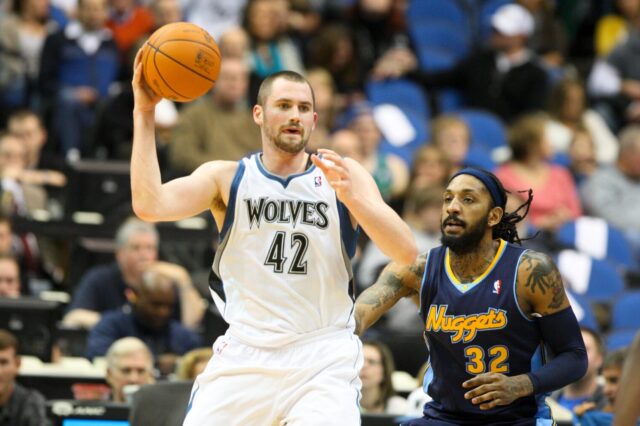In nearly six months at the helm as the NBA’s newest commissioner, Adam Silver has mostly done things right. With one glaring exception: the recent announcement that any NBA franchise that has previously won an NBA Championship will feature gold tabs on their uniform collars this season.
Huh?
Apparently the idea was borrowed from the star system used on FIFA World Cup jerseys. And the NBA should know better than anyone that an idea stolen from soccer is a bad one. What's next, a time clock that goes up instead of down? Ties? Dick Bavetta whipping out yellow cards? Flopping?
(Oh, wait, we already have plenty of flopping in the NBA. Scratch that.)
I’d be all for the 2014 NBA Champion San Antonio Spurs donning the gold tabs, but it’s absurd that 16 other teams (the Oklahoma City Thunder smartly declined the gold tab inclusion, which would have been an homage to the 1979 Seattle Supersonics … a franchise that Oklahoma City essentially stole from Seattle in 2009) will allegedly be wearing them. I mean, do the Sacramento Kings really have the right to gloat 63 years after their ancestral Rochester Royals claimed the franchise’s lone NBA title? Shouldn’t the Atlanta Hawks be a little embarrassed to brag about their solo championship won in 1958 … when the franchise was located in St. Louis? And last I checked the Portland Trail Blazers, Washington Bulle-errrr-Wizards and Milwaukee Bucks are between 35 and 40-plus years removed from their lone NBA titles.
Of the four major sports leagues in the United States, the NBA should be the last one to brag about its 30 franchises when it comes to winning championships. After all, just nine – nine! – NBA franchises have claimed a title since Magic Johnson and Larry Bird entered the league in 1979. Let me repeat that … nine!! And if you take away the solo championships won by the Philadelphia 76ers (1983) and the Dallas Mavericks (2011), the number drops to a paltry seven. In that same time span Major League Baseball has anointed 19 different champions and the NFL and NHL have featured 16 championship franchises apiece. But multiple winning franchises can’t happen in a 35-year span when the Los Angeles Lakers win 10, the Chicago Bulls six, the San Antonio Spurs five, the Boston Celtics four, the Miami Heat and Detroit Pistons three each, and the Houston Rockets two since the dawn of the NBA’s modern era in 1979-80.
The lack of championship parity in the NBA certainly doesn't go unnoticed in Denver, one of four ABA holdover franchises from the NBA/ABA 1976 merger and the only franchise of those four to not yet appear in an NBA Finals, nevermind win one (by the way, if you feel like you've already read this rant from me before and want to accuse me of being a Rick Reilly-like-self-plagiariser go right ahead, I deserve it somewhat). As I've written over and over since this blog's inception in 2008, the system of the NBA makes it incredibly difficult – if not altogether impossible – for the average franchise to ascend to the championship throne … and that's regardless of market size, even though it doesn't help when you have the 17th largest market in the NBA as Denver does.
But rather than give Nuggets fans everywhere that glimmer of Arron Afflalo-esque hope when the 2014-15 season kicks off sometime near Halloween, by shoving little gold tabs in our faces the NBA is going to rub in just how far its Mile High City-based franchise has always been, and will always be, from achieving true NBA greatness.
Beyond the problem of not enough diverse NBA franchises actually winning championships during the league's modern era, the NBA doesn't boast a great record of NBA Finals participants being shared equitably either. Using the same 1980 benchmark, in addition to just nine NBA franchises winning championships only another nine (again, nine!!) have competed for one (Portland, Phoenix, New York, Orlando, Seattle/OKC, Utah, Indiana, New Jersey/Brooklyn and Cleveland). That means just over half of the NBA's 30 franchises have appeared in an NBA Finals in 35 years. Comparatively, in the same time span the NFL has seen 25 of it's 32 teams appear in a Super Bowl, MLB has had 27 World Series participants among its 30 teams (including the Colorado Rockies … no joke, the Rockies!) and in the NHL 23 out of 30 franchises have competed for a Stanley Cup.
Now, it’s possible that the NBA’s new collective bargaining agreement (or CBA), agreed upon in 2011, might help resolve the issue of a lack of parity in the NBA. In theory, the new CBA was meant to keep star players with the teams who drafted them by allotting a fifth year of guaranteed salary for players who stay with teams they previously played for and disallowing a fifth year to players involved in sign-and-trade deals. The jury remains out on the new CBA as Dwight Howard bolted the Lakers for the Rockets in 2013, forgoing that fifth year of guaranteed money and LeBron James just bolted from the Heat to sign with the Cleveland Cavaliers for a two-year deal (assumed so that James can take advantage of the NBA’s new and sure-to-be grotesquely huge TV deal in 2016) … ironically, of course, the franchise that drafted James in the first place. But Carmelo Anthony – eligible for that fifth year from only his current team, the New York Knicks – opted to take the guaranteed fifth year and stay put, worth nearly $28 million five years from now. Might more players do the same as their deals come up next summer?
Regardless of the nuances of the new CBA, the NBA is doing itself a huge disservice by showcasing those little gold tabs on the uniforms of the 17 franchises that have won NBA Championships since the league's inception in 1946. It does nothing but flash a giant spotlight on the league's longtime inability to give all its franchises – and the fans who spend millions of dollars on tickets, merchandise and so forth – a fair shot at celebrating an NBA title. With James joining the Cavaliers (a one-time NBA Finals participant, zero-time winner), the NBA has a good chance of that "nine number" becoming a 10 come next June.
But don't be the least surprised if the 2015 NBA Championship is duked out between the Spurs and the Bulls, thus continuing the NBA's unofficial mantra that all can play, but only a very (lucky) few can actually win.


